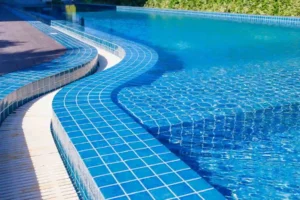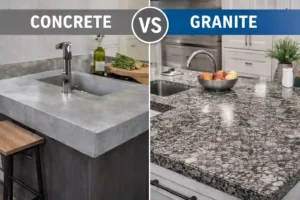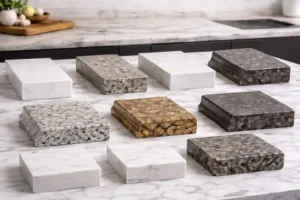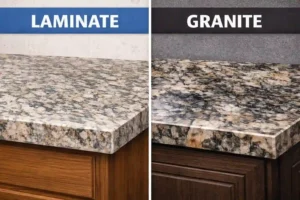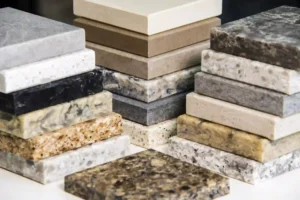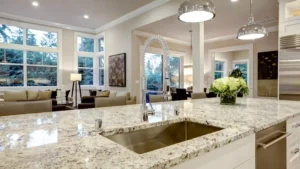How thick your granite or marble countertops should be? This is a key question every homeowner should ask before starting a kitchen or bathroom upgrade. The right countertop thickness affects not just how your space looks, but also how it performs over time. From added strength to better edge detailing, getting the thickness right ensures your investment lasts for years.
At SF Marble and Granite, we specialize in custom countertop fabrication and installation across Lowell, MA. With over 10 years of experience in granite and marble surfaces, we help clients choose the perfect thickness based on their style, layout, and daily needs. In this post, we’ll break down the ideal countertop thickness options and what works best for each type of project.
Table of Contents
ToggleWhy Countertop Thickness Matters
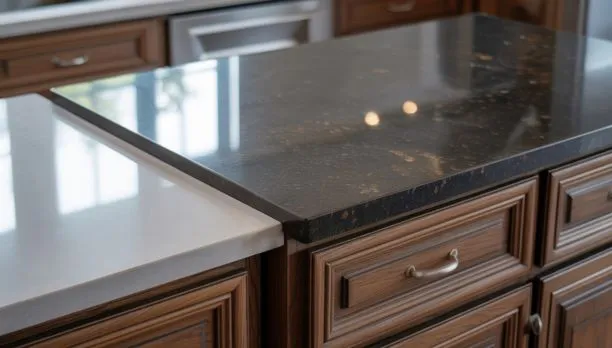
How thick should granite or marble countertops be? Thickness plays an integral part in their strength, style, and even installation process.
1. Strength and Durability
Thicker slabs, like 3 cm, offer more support and are ideal for busy kitchens. Thinner 2 cm options may need extra reinforcement. At SF Marble and Granite, we guide you to the best fit based on use and layout.
2. Style and Appearance
Thicker granite or marble countertops look luxurious, while thinner ones add a modern, minimalist aesthetic. Finding the appropriate thickness helps define your design aesthetic.
3. Cost Differences
Thicker slabs tend to cost less, yet may need support and may incur labor expenses, while thicker materials increase costs while adding durability.
4. Installation Factors
3 cm slabs tend to be heavier and more stable, while 2 cm ones often need an additional plywood base for support and safe installation. At SF Marble and Granite, our expert team ensures smooth and safe installations regardless of which option is selected.
Standard Thickness Options for Granite & Marble
When determining the thickness of granite and marble countertops, it’s essential to be familiar with their various standard slab thicknesses and which one works best in each situation. Thickness has an enormous impact on their look, performance, cost, and maintenance – let’s explore all your options together!
2 cm (3/4 inch): Lightweight & Budget-Friendly
- This is the thinner option and works well in spaces with lower usage, like bathroom vanities or wall-mounted counters.
- It’s lightweight, easier to handle, and slightly more affordable.
- However, it typically needs a plywood base for added strength, especially in kitchens.
If you’re installing marble near areas like a grey marble floor, or where maintenance like sealing the marble floor is key, 2 cm may be a suitable match for light daily use.
3 cm (1 1/4 inch): Strong & Most Popular
- This is the industry standard for kitchen countertops and high-use surfaces.
- No additional support is usually needed. 3 cm slabs are naturally sturdy.
- Offers a bolder, premium look and allows for more elegant edge profiles.
If you’re concerned about wear, water exposure, or issues like marble stains, a thicker 3 cm slab is easier to maintain and lasts longer in busy areas.
Custom Thicknesses for Special Projects
Certain projects call for particular thicknesses, whether thicker or layer-built systems.
- Waterfall countertops, oversized islands, and luxury designs often use stacked edges for a dramatic effect.
- Commercial spaces may need extra-thick surfaces for heavy use and visual impact.
At SF Marble and Granite, we help clients explore custom thicknesses based on their goals, whether you’re designing a minimalist vanity or a bold kitchen centerpiece.
Granite vs. Marble: Does the Ideal Thickness Differ?
When selecting how thick your granite or marble countertops should be, it’s essential to understand that not all stone types behave similarly. Granite and marble may look similar, but each has unique properties such as durability and structure that determine how thick each should be cut and installed.
Natural Hardness Differences
Granite is one of the hardest natural stones used for countertop designs, making it dense, tough, and resistant to daily wear and tear. Marble, on the other hand, is more porous and requires additional care compared to granite; therefore, it determines how thick either material should be for optimal performance in kitchens or bathrooms.
Why Granite Supports Thinner Slabs
Because of its solid structure, granite can often be used in a 2 cm thickness without worry, especially in smaller spaces or where it’s fully supported. In kitchens, many homeowners still choose 3 cm granite for extra durability and visual depth. If you’re comparing options like butcher block or granite, granite offers a more durable surface with less maintenance in the long run.
Why Marble Might Need Reinforcement
Marble’s softness means it can crack or chip more easily if not properly supported. That’s why most professionals, including local quartz fabricators and stone experts, recommend 3 cm marble for kitchen countertops. For 2 cm marble slabs, added support like plywood backing is usually required, especially under sinks, overhangs, or islands.
If you’re installing marble or granite countertops in a busy space, choosing the right thickness isn’t just about style; it’s about safety and long-term performance.
Factors to Consider When Choosing Thickness
How thick should your granite or marble countertops be? The answer depends on several simple but important factors.
- Cabinet Strength: Thicker slabs (3 cm) work best with strong cabinets. Thinner slabs (2 cm) may need plywood backing to prevent cracks and reduce future granite repair needs.
- Overhangs & Edges: If you want fancy edges or extended overhangs, thicker countertops provide better support.
- Budget: 2 cm slabs are more affordable but may come with extra labor. 3 cm offers more value over time.
- Slab Availability: Some styles of granite or marble countertops may only be available in certain thicknesses.
- Design Style: Go bold with thick slabs or choose a sleek look with thinner ones—it’s all about your taste.
At SF Marble and Granite, we help you pick the right thickness for your space, budget, and style.
Edge Profiles and Thickness: What You Should Know
How thick should my granite or marble countertops be if I want stylish edges? The answer goes beyond strength; it also determines the style of their edges.
Thicker slabs (like 3 cm) allow for deeper, more detailed edge designs such as Ogee, Bullnose, or Beveled. These edges look elegant and add a high-end finish to your kitchen or bathroom. With thinner 2 cm slabs, simpler edge styles like Eased are more practical and visually balanced.
If you’re planning a custom granite installation, choosing the right thickness ensures the edge style you want can be achieved cleanly. At SF Marble and Granite, we help you match slab thickness with edge profiles that complement your overall design.
Myths About Countertop Thickness You Shouldn’t Believe
When deciding how thick your granite or marble countertops should be, don’t fall for these common myths:
- Thicker is always better – While 3 cm slabs are strong, 2 cm slabs can be just as reliable with proper support.
- You can use any thickness anywhere – Each area in your home has different weight and design needs.
- 2 cm is too weak for kitchens – Not true. Many kitchens use 2 cm slabs successfully with reinforcement.
Choosing the right thickness isn’t about following trends; it’s about finding what works best for your space, style, and how you use your countertops daily.
Expert Advice: What SF Marble and Granite Recommends
At SF Marble and Granite in Lowell, Massachusetts, we often receive questions regarding the thickness of granite or marble countertops. After over 10 years serving homeowners there, we’ve learned that finding an appropriate thickness depends on factors like space considerations, design preferences, and daily use patterns.
What We Recommend:
- 3 cm thickness is our top-selling option for kitchens due to its strength and edge profile flexibility.
- 2 cm slabs are great for bathrooms or smaller vanities with proper support.
- For unique projects like matching countertops with a marble floor installation, we consider style flow and slab weight.
Our team provides customized advice based on your layout and needs to ensure both function and beauty can coexist without compromise.
Final Thought
Deciding how thick your granite or marble countertops should be comes down to your space, style, and how you plan to use them daily. Whether you prefer the sleek look of 2 cm slabs or the bold, durable feel of 3 cm, the right choice will enhance both the function and beauty of your kitchen or bathroom. Thickness also affects edge design, cost, and long-term durability, so it’s important to make an informed decision.
At SF Marble and Granite, we help homeowners across Lowell, MA, choose the perfect countertop thickness for their homes. Our expert team is here to guide you from selection to installation, ensuring your project is smooth and stress-free. Ready to get started? Contact us today for a free consultation and discover the best stone solution for your space!
FAQs
How thick should your granite or marble countertops be for a kitchen?
For most kitchens, a 3 cm (1 ¼ inch) thick slab is ideal. It offers durability, supports overhangs without extra reinforcement, and works well with decorative edge profiles.
Can I use 2 cm slabs in high-use areas like the kitchen?
Yes, but only with proper support. If you’re wondering how thick your granite or marble countertops should be in heavy-use areas, 2 cm can work if reinforced with plywood backing and installed professionally.
Does countertop thickness affect the price?
Absolutely. Thicker slabs generally cost more due to added material and labor. However, when asking how thick your granite or marble countertops should be, remember that thicker options often offer better long-term value.
Will the thickness impact my edge profile options?
Yes. 3 cm slabs allow for more detailed and decorative edges like ogee or bullnose. Thinner 2 cm slabs are limited to simpler edge styles, such as eased or beveled.
How do I choose the right thickness for my project?
Ask yourself: where is the countertop going, how often will it be used, and what look do you prefer? Still unsure how thick your granite or marble countertops should be? Contact SF Marble and Granite, and our experts will guide you based on your layout, budget, and style goals.

